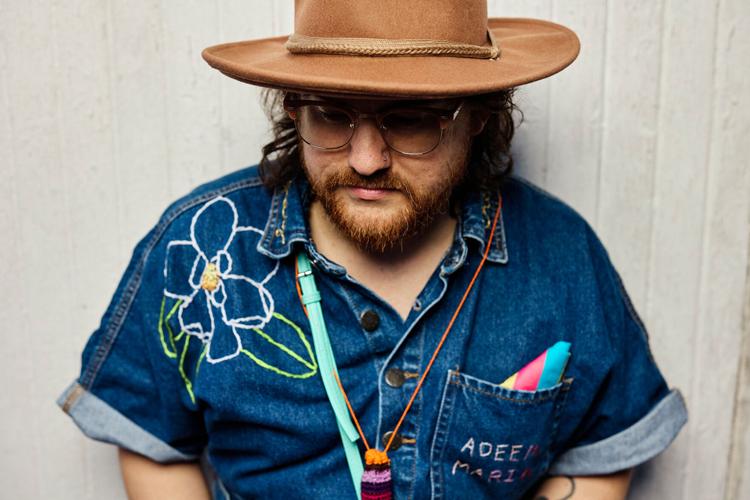
Adeem the Artist
In country music, sharing one’s origin story is a rite of passage. Though they’re not likely to get as much attention as, say, the “truck songs” that have become so ubiquitous, or the heart-wrenching breakup ballads that seem to be requisite, origin songs are still important. They introduce listeners to an artist via linked biographical snapshots, and the best of the bunch capture the essence of a life with great intimacy and succinctness. “Carolina,” the opening track of Adeem the Artist’s new album White Trash Revelry, out Friday, stands alongside the genre’s best.
“I started out as a light in my father’s eye at a Texaco / Mama was working overnights on Sam Wilson Road,” Adeem sings, beginning the story with an evocative image truly deserving of the oft-overused descriptor “cinematic.” Each line of the song is more powerful than the last, like the sucker-punch of a lyric, “From my grandpa’s fist to my mother’s lip / There’s an ancestral impression.” A listen through the rest of White Trash Revelry reveals that Adeem isn’t one to waste a word or leave it out of place.
Many listeners became fans of Adeem through their 2021 record Cast Iron Pansexual, which drew critical acclaim from country and roots outlets and laid the groundwork for the wildly successful crowdfunding campaign that would pay for White Trash Revelry. As Adeem tells the Scene, where Cast Iron Pansexual explored sexual and gender identity and the ways they interact with Appalachian culture, White Trash Revelry leans more heavily on the culture itself and its layers and nuances.
“I exist at this intersection of marginalization and privilege,” says Adeem. “I am a nonbinary queer country musician. I am pansexual. I use they/them pronouns. I’m a member of the trans community. I’m also a white person, with 30-some odd years of cisgendered male privilege and male socialization. And I’m a low-class, white-trash kid from rural North Carolina. These different aspects of identity are endowed with various marginalizations and privileges. With this record, I had intended to lean a lot more heavily on my privileges. … I really want it to be my way of interfacing with my community of, to say it concisely, poor white people.”
Though Adeem wrote “Carolina” back in 2017, the song was integral to their process of making White Trash Revelry. They recount that song as one of the first on which they went back and revised lyrics, eschewing an earlier style of writing that glorified the rawness of a song over its precision. While both methods certainly work for Adeem, that attention to detail makes White Trash Revelry the kind of album that rewards close and repeated listens. “Heritage of Arrogance,” for example, recalls a childhood encounter with the KKK and a group of Black counter-protestors, to which their father replied simply, “Yeah, they hate each other.” Adeem sees their own understanding of bigotry as information not readily available to a lot of people from communities like their own.
“A lot of folks in my community have not had the experiences I’ve had, to have their hand held through understanding that racism still exists,” they say. “It sounds really silly, but that’s true. So I really wanted to come at this record from a posture of, ‘Look, I am racist. I am 34 years old. And all the years of my life, I have been socialized to inhabit racism. That’s just the situation of America.’ ”
After raising more than $17,000 through a crowdfunding campaign, Adeem was able to hire some of their favorite musicians — some of whom are friends, others who were strangers — to play on the LP. Among others, the players include guitarists extraordinaire Ellen Angelico and Joy Clark, songsmith and banjo ace Jake Blount, former Turnpike Troubadour Giovanni “Nooch” Carnuccio III on drums and singer-songwriter Mya Byrne on lap steel. The group quickly established a rapport, and their chemistry is evident across the album’s excellent arrangements, which also owe a debt to producer Kyle Crownover.
“Nobody’s ever met each other before,” Adeem says. “And we get together. I would play the song, talk about the song. Everybody would write their parts through one session, and then we’d start recording. And we just did that for three days.”

Our conversation took place two days after a gunman in Colorado Springs shot and killed five people and injured dozens more at the queer nightclub Club Q. The tragedy weighed heavy for Adeem, even when considering the positive impact music like theirs can have for the queer community. As Adeem explains, their music — and their growing popularity — brings more public attention to their place as a queer person, which can unfortunately feel scary and dangerous.
“I do feel different,” they say. “And it’s tough for me to think about it having a positive impact right now. It’s tough for me to separate myself emotionally from the fear and everything, and consider that people can learn and grow. But I really hoped [for that] with this record, and I still still do to some extent.”
Though that heaviness will linger, Adeem plans to bring a joyful, inclusive album release celebration to The Basement on Friday. Joining Adeem will be the talented and fantastically named Flamy Grant, a drag queen and musician whose latest album Bible Belt Baby, which came out in October, bridges the gap between contemporary Christian music and queer culture. Adeem also shares that there is a right-wing protest planned for their Dec. 3 show in Maryville, Tenn.
“For us to be in Nashville at The Basement, having a drag performer and singing songs — it feels important right now, with everything going on. It feels like it has a new level of importance that it didn’t before.”






